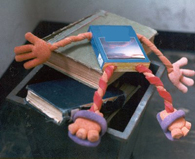The Vitoria-Gasteiz Prizes for Childrens and Young Peoples Literature

The Vitoria-Gasteiz Prizes for Childrens and Young Peoples Literature were awarded at the Vitoria Town Hall this year on December 3, 2008, on the occasion of the Day of Euskara and shortly after the death of Mikel Laboa.
This year was the fifth in which Vitoria-Gasteiz Prizes of Children's and Young People's Literature have been awarded; these are the only awards with a translation category in childrens and young peoples literature. Works of any genre published within the preceding year may be submitted for consideration for the 9,000-euro prize. Winning works must reflect certain values understanding among different cultures, tolerance, the principles of democracy and must be free of xenophobia, racism and sexism. The call for submissions for Best Translation into Basque of a Work of Childrens and Young Peoples Literature published in 2007 appeared in the April 2, 2008, edition of the Arabako Aldizkari Ofiziala (Official Journal of Alava).
There are two categories: childrens literature (books for children aged 6 to 12) and young peoples literature (books for young people aged 12 to 18). In previous years, few submissions have been made and the deadline has sometimes been extended. This year, there were 14 submissions.
The panel of judges (Lurdes Auzmendi, Gidor Bilbao, Maite Imaz, Manu Lopez and Imanol Zurutuza) awarded prizes to Gerardo Markuleta and Antton Olano for their translations of works of childrens and young peoples literature, respectively.
Markuletas translation of Fernando Palacios work, El tiempo congelado (Frozen Time) was published under the title Denbora izoztua. It appeared as a book with accompanying CD, with music performed by Jesus Guridi and Luis Aranburu. The story takes place in Vitoria.
In the category of Young Peoples Literature, Bai baina ez baina bai (Yes, But No, But Yes) was the title Olano gave to his translation of Valencian Pasqual Alaponts humorous work, Fi de culs a Mallorca.
Kudos to the City Council of Vitoria for their awards for human values and literary translation.



